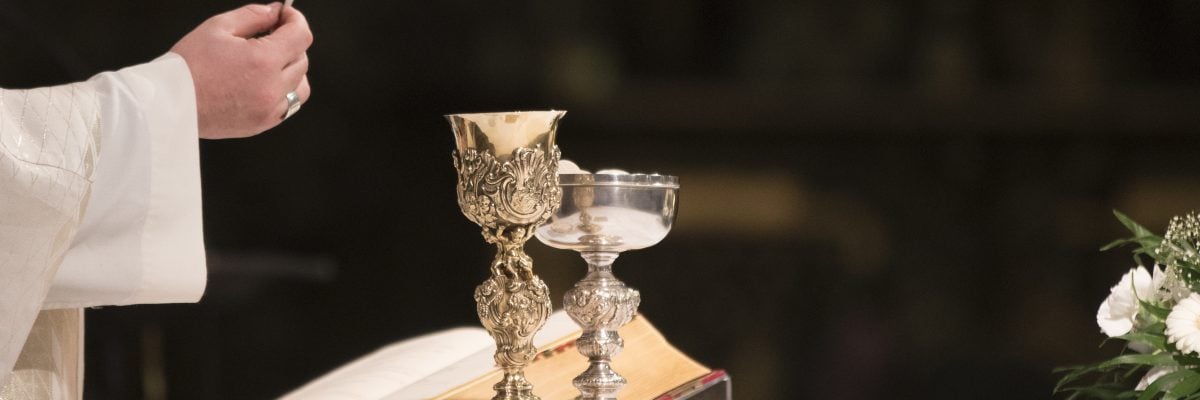
Every so often, when I appear on Catholic Answers Live, a caller asks whether a non-Catholic may receive Communion at a Catholic parish or a Catholic take the “Lord’s Supper” at a non-Catholic church. My answer always begins with canon 844 of the Code of Canon Law.
That canon has five sections. The first says that “Catholic ministers may licitly administer the sacraments to Catholic members of the Christian faithfully only and, likewise, the latter may licitly receive the sacraments only from Catholic ministers.” So, in general, the answer to questions I get about intercommunion is “No.” But there are exceptions, and those are handled in the following three sections.
Exceptions to the no-intercommunion rule
Section 2 permits a Catholic to receive Communion in a non-Catholic church if that church has a valid Eucharist. (This section also deals with receiving penance and anointing of the sick, but no one ever asks me about receiving those in a non-Catholic church.) Since no Protestant church, including the Anglican, has a valid Eucharist, Catholics who sit through the “Lord’s Supper” at, say, a Baptist church may not partake of the bread and wine there (or bread and grape juice, as the case may be).
The problem is that the bread and wine are just that—bread and wine—and not the Body and Blood of Christ. Protestant churches have no valid Eucharist because they have no valid priesthood, and they have no valid priesthood because the sixteenth-century Reformers did away with the episcopacy. You can’t have priests unless you first have bishops.
By contrast, the Eastern Orthodox churches have maintained a valid episcopacy and priesthood and thus have all seven sacraments. These are the non-Catholic churches at which a Catholic might receive Communion—provided “it is physically or morally impossible” for the Catholic “to approach a Catholic minister.” This could occur if the Catholic were living for a long time in an area, such as large tracts of Siberia, where there are few or no Catholic parishes.
Section 2 is not applicable to Catholics in this country who simply want to “sample” another religion. The permission is given only when “necessity requires” and “provided that the danger of error or indifferentism is avoided.” Almost no American Catholic will ever be in a position to take advantage of section 2. After all, if a Catholic in the U.S. can make it to an Eastern Orthodox parish, he likely can make it to a Catholic parish.
Eastern Orthodox in a Catholic church
Section 3 deals mainly with Eastern Orthodox who want to receive sacraments at a Catholic parish. It says that Catholic ministers may give penance, anointing of the sick, or the Eucharist “to members of the oriental churches which do not have full communion with the Catholic Church.” (“Oriental churches” is the term used to signify the Eastern Orthodox churches. The term “Eastern Orthodox” is not used in canon law, though we use it in everyday parlance.)
The provisions of section 3 apply to other churches that the Vatican may determine to have valid sacraments—perhaps one of the offshoots of the nineteenth-century Old Catholic movement, for instance, though many of those churches seem to have jettisoned apostolic succession, some of them even having become New Age churches that may retain the word sacrament but none of its real meaning.
Non-Catholics who qualify under section 3 must “ask on their own for the sacraments”—this means there can be no general invitation to them—and they must be “properly disposed,” which means in the state of grace.
Properly disposed Protestants
Section 4 applies mainly to Protestants, though that term, like “Eastern Orthodox,” is not used in canon law. This section says that “if the danger of death is present or other grave necessity,” and if the diocesan bishop approves, Catholic ministers may give the three sacraments to Christians who are neither Catholic nor Eastern Orthodox. Such people must not be able to approach a minister of their own community, must ask for the sacraments on their own (again, there is to be no general invitation to non-Catholics to “come up and receive Communion”), must be in the state of grace, and must “manifest Catholic faith in these sacraments.”
This means their understanding of the Real Presence, for example, must be the Catholic understanding. Several Protestant churches describe what they have as the “Real Presence,” though in fact none of them have it, and they do not mean by the term what we mean. This causes no end of confusions.
Some Protestants who profess belief in the Real Presence have in mind a “really meaningful” symbolism. Others say Jesus is “really” though only “spiritually” present at their churches’ celebration of the “Lord’s Supper.” Not a single Protestant church teaches the Catholic doctrine, though a few individual Protestants have come to accept the Catholic understanding on their own. It is for them that this section makes provision.
Section 5 says that no diocesan bishop or conference of bishops may institute general norms regarding the four preceding sections of canon 844 “except after consultation with at least the local competent authority of the interested non-Catholic church or community.” We don’t want to step on anyone’s toes, and we don’t want anyone to step on ours.
Friends don’t invite friends to lie
I had a chance to put section 4 to use in Rome. I was attending a private papal Mass at the Apostolic Palace. This was when John Paul II was pope. I entered through the famous bronze doors and was taken to a small waiting room. There I met the other guests, two Protestant families from the U.S. One was from Dallas, where they owned a television station. The other was from Chicago, where they owned a radio station.
In a few minutes a Swiss guard came to escort us to the chapel. As we ascended the staircase, I asked the Protestants whether anyone had filled them in on Catholic protocol regarding Communion. No one had. I explained the rules, as discussed above, and I said that they should refrain from getting in the Communion line. The way I put it was this:
“When we go up for Communion, we are saying with our bodies, with the very act of approaching Communion, that we believe everything the Catholic Church teaches about the Eucharist and about everything else. But you don’t believe all that; if you did, you’d be Catholics. If you were to approach Communion, you’d be telling a lie with your action. You’d give people the impression that you believe one way when you really believe another. You shouldn’t do that, and Catholics shouldn’t invite you to do that, because friends don’t invite friends to lie.”
They took my comments gracefully and remained in the pews when others went up to receive. They took no offense but said they appreciated that the Catholic Church had rules about such things, and they respected the rules. Like the rest of us, communicants or not, after the Mass they moved to the adjacent room, where they were introduced to the pope. They didn’t go away empty-handed. Like the rest of us, they received rosaries blessed by the future saint.



